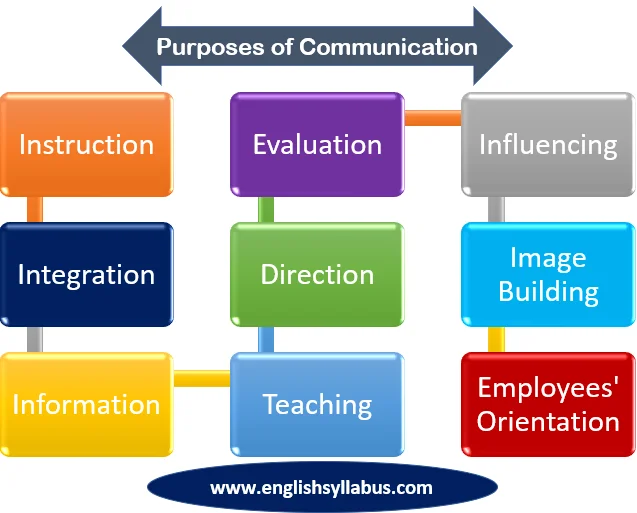What are PURPOSES OF COMMUNICATION
There are main ten Purposes of Business Communication instruction, evaluation, influencing, integration, direction, image building, information sharing, teaching and employees’ orientation, etc.
1. Instructional purposes of Communication
Communication’s instructional role immediately negotiates with the notion of commandment. The management transmits the needed instructions from the top to the bottom level in this procedure. So, all relevant instructions and recommendations are directed from the top to the bottom of a hierarchy in this manner. The only objective on the inside is to complete the specific tasks assigned by the authorities.
2. Integrational purposes of Communication
The second goal of communication is to systematically integrate distinct organizational roles. The integration component of communication’s major duty is to maintain ties amongst the many jobs in an organization. And, establishing interconnections also aids in the integration of various managerial positions.
3. Information
Another aim of communication in the workplace is to tell employees about a certain workout, company rules and strategies, and so on. At the grassroots level, senior leadership shares guidelines. Throughout the company, facts and information move not only upwards but also horizontally. One of the primary goals of communication is to transfer information from one level to another.
4. Evaluation
Simply said, evaluation is a judgment on the value of work that we may obtain through communication. We use the Communication tool to assess people and groups as they perform various responsibilities in an organization. Systems require a suitable and practical communication strategy to assess personal data such as input, output, or a different argument.
5. Direction
Then, issuing referrals to top management or subordinates necessitates communication. Under the supervision of his or her boss, an employee may perform better. Oral or written communication can be used to guide others. A normal order, an application order, or a defined order are all options.
6. Teaching purposes of Communication
Indeed, personal safety at work is a topic that has received a lot of attention. To educate and educate employees on personal safety in the workplace, a thorough communication method is required. Employees benefit from this communication because it helps them avoid accidents, save money, and so on.
7. Influencing
Preferably, to influence others or to persuade, the entire communication process has particular requirements. For example, a person with the ability to convince others is ready to get through the big deals with his good communication skills only. It refers to the giving of a response that reveals the communication’s judgment.
8. Image Building
So, a business cannot exist in a vacuum from the rest of society. The community and the businesses that operate in the community have a link and a partnership. In the community, there has been an increase in kindness and self-assurance. It is possible to accomplish so by contacting various media outlets that should represent the company’s public image. An entity’s aims, functions, progress, and public commitment must all communicate to the public through an effective external communication system.
9. Employee’s Orientation
When a new member starts the company at that point, he or she will be inexperienced with the company’s programs, policies, and culture, among other things. After, people get more familiar with colleagues, supervisors, goals, objectives, rules, and organizational laws as a result of communication.
10. Other Purposes of Communication
The decision-maker requires information to materialize the process of effective decision-making feasible. As of now, we can see that the decision-making process depends upon effective communication procedures. Everyone in the company should, in general, give the knowledge they need to accomplish their jobs successfully and efficiently.


